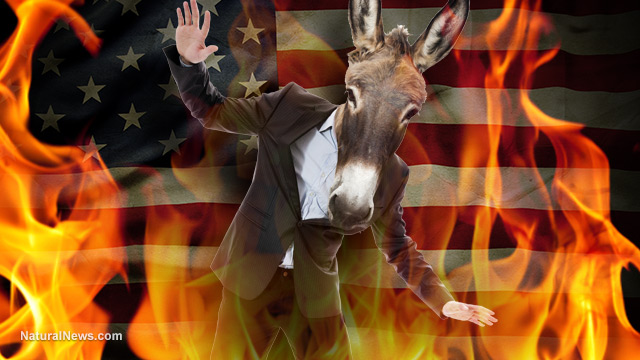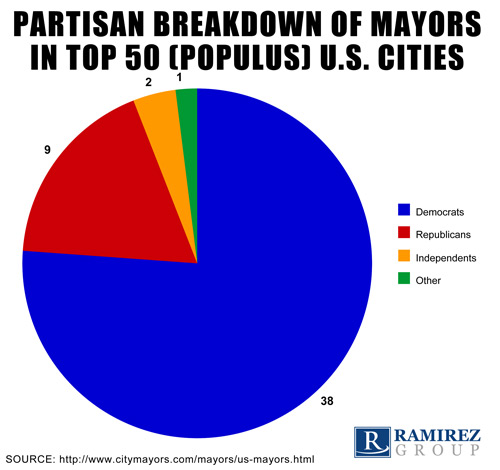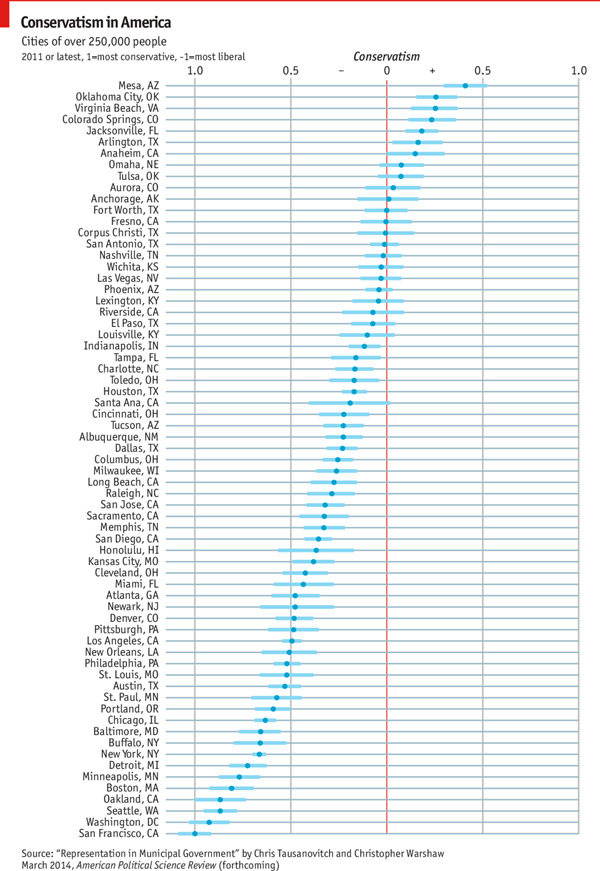The political fallout of disastrous events: 75% of those who die in a catastrophic collapse are likely to be Democrats
 Friday, August 28, 2015
Friday, August 28, 2015
by Mike Adams, the Health Ranger
Tags: catastrophic collapse, democrats, voter fatalities

(NaturalNews) In terms of the really big shifts in the voting base of political parties, the largest shift happening right now is the ballooning of Democrat party voters who are illegals. The Democrats have fought hard to outlaw voter ID laws while maintaining wide-open borders, essentially surrendering America to a foreign invasion as a deliberate strategy to win elections and stay in power at any cost. (It's a wildly successful strategy if you wish to win votes, but widely suicidal if you wish to keep your nation strong.)
Despite all this, there's a massive shift in voter demographics that could emerge virtually overnight, causing large numbers of fatalities among those who tend to vote for Democrats. It turns out that people who live in cities are far more likely to die in the unfortunate aftermath of various catastrophic events. (Cities are death traps, as I'll explain below.)
Cities are roughly 75% - 80% liberal, whereas rural areas are roughly 75% - 80% conservative. Thus, any event that causes disproportionate deaths in large cities will, by definition, cause a disproportionate number of casualties among those who tend to vote for Democrats.
This chart shows the political affiliation of the mayors of America's top 50 cities to be about 75% Democrat:

(Interestingly, cities actually promote a more interdependent political philosophy of sharing, government entitlements, and so on, while rural life promotes a more independent mindset of self-reliance and individuality. People who grow up in the country and move to cities tend to drift toward a more "progressive" lifestyle, while those who grow up in cities and move to the country tend to shift toward more conservative or independent beliefs.)
The intelligent question is, then: What sort of collapse events would be so catastrophic that they might cause widespread fatalities across large cities?
Here's another chart showing the strongly liberal slant across America's top cities:

Catastrophic events that would cause large fatalities in cities (but not rural areas)
To fully understand the following list, you first need to understand the basics of what cities are and how they function.Cities are artificial constructs that depend almost entirely on outside resources for their survival.
Most cities do not have their own water supply. They import water and then export liquid waste.
Cities do not have their own food supply. They import food and export sewage.
Cities do not have their own power supply. They import power (via the grid) and consume it.
Cities are not sustainable. If cut off from the countryside, cities implode and their citizens perish.
Cities are far more susceptible to disease, unsanitary sewage problems, unclean air, polluted water and the rapid spread of infectious pandemics.
Cities are to humans what factory farms are to cattle, in other words. Living in a city is a confined, controlled existence, while living in the country is a "free-range" experience.
Just as importantly, the kind of people who live in cities tend to have few survival skills and relatively little practical experience doing anything with their bare hands in the real world. Most city dwellers have abstract professions involving paperwork, digital realm tasks, bureaucracies, highly intellectual "brain work" (i.e. university staff) and so on (or no work at all because they're living off entitlements). Rural dwellers, on the other hand, tend to have more "hands-on" jobs involving agriculture, ranching, construction, warehouse operations, mechanical skills and even the burdensome activity of cooking meth in your trailer (and sometimes accidentally blowing the roof off, which causes old tires to be catapulted off the structure and go bouncing down a dirt road, creating yet more opportunities for physical exercise).
City people, in other words, are good at "brain stuff," while country people are good at "hands-on stuff." Normally, city people describe all this as explaining why they are superior and more cultured, yet all the "brain stuff" becomes totally worthless in a collapse scenario, handing an immediate advantage to those who have hands-on skills.
With this in mind, here are the kind of events that might disproportionately cause high fatalities in cities (liberal areas) but not the countryside (conservative areas):
• Pandemic disease - It spreads rapidly in cities where people lack vitamin D (because they work indoors) and live in close proximity to each other while sharing public transportation. A densely packed liberal city with a subway system is utopia for a pandemic virus.
• Power grid collapse - City infrastructure rapidly collapses without power. The water supply fails, fuel pumps stop working and food deliveries stop. In the country, people can "rough it" for a few days with a camp stove in the back yard, but in cities, there are few options.
• Food shortage - When food supplies are disrupted or cut off, cities become starvation zones. Not only are city people unable to grow their own food; they usually don't have much space to store food, either. So they starve in a crisis. Rural citizens, on the other hand, have all sorts of options for expedient food, ranging from wildcrafted edibles to hunting small game. I always marvel at how much food is around me every day when I'm walking around the ranch. In a pinch, a person could just juice grasses and drink the juice to stay alive. (That's what horses and donkeys do, essentially, and they're large creatures.) But in a city, you can't eat concrete. (Although city people can actually EAT EACH OTHER. Yep, cannibalism is the last desperate food storage option for the chronically unprepared...)
• Banking collapse - City people tend to depend heavily on ATMs, credit card transactions, food stamp cards and banking services just to feed themselves each day. When banking systems fail, many will starve. Those who live in the country, however, can very easily operate on cash, barter or community exchange systems. Plus, most country people can feed themselves or find food on their own.
• Social unrest and riots - Cities are where rioting crowds tend to burn down their own neighborhoods. Under conditions of social unrest, cities become police state death zones. Meanwhile, almost nobody riots in rural areas. There simply aren't enough people around to bother with the activity.
• Act of war / martial law - Cities are the very last place you want to be in times of war (nuclear attack, invasion, etc.) They rapidly become death zones where people starve and scrounge for basic survival supplies (like antiseptics). In war zones, people stuck in the cities tend to die from common, low-grade infections and lack of basic sanitation. Rural areas, meanwhile, are far safer for the simple reason that they usually are not strategic control points desired by the warring factions.
(On a side note, California is now reverting to such a Third World status that homeless people are now routinely defecating in the streets of San Francisco. It's worth noting that you never see people defecating in the streets of rural towns. Nope, they save that activity for the woods!)
• EMP attack - Cities are extremely dependent on electronics to function. Water supplies, food, fuel, police security and other essentials are all vulnerable to an EMP attack. Should such an attack occur, cities will almost instantly devolve into gang-run chaos zones (just look at the aftermath of Hurricane Katrina and other similar events). Because city people tend to hate guns, they are almost universally disarmed... making them ideal victims for heavily armed violent gangs that will overrun the police in mere hours.
• Terrorist poisoning of water supplies - Cities are highly vulnerable to terrorist attacks via the water supply. With a surprisingly small amount of a poisonous or radioactive substance, a would-be terrorist can shut down a large U.S. city for days, sending that city into fits of social chaos and unrest. Water bottles sold at retail will be stripped clean in a matter of a few hours, putting the entire city population under the emergency control of FEMA... a death sentence for certain! In rural areas, by the way, citizens usually know where to find alternative water sources such as streams, ponds, lakes or wells that can be filtered using simple water filtration devices. (If you want to know how easy it is to acquire toxic poisons that terrorists could use for this purpose, recall that Michigan State University shipped me a massive supply of toxic mercury that a terrorist could have used to poison the water supply of an entire city.)
• Natural disasters: super volcano, meteor strike, earthquakes, etc. - When natural disasters strike cities, they produce far more casualties than in rural areas. Earthquakes in particular tend to collapse tall buildings, whereas the same quake striking a rural area does relatively little damage to single-story homes. Any natural disaster requiring the mass evacuation of a large city is a catastrophic scenario just waiting to happen: Most large cities simply don't have the road capacity to handle the full evacuations of everyone who lives there.
The above are just a few examples, but it's difficult to think of a collapse scenario that doesn't hit cities harder than rural areas.
Democrats are just one event away from losing their voter base
What all this means, by the way, is that the Democrat Party is quite literally just one collapse event away from losing its voter base. It may seem odd to think of collapse events in this way -- after all, any human life lost in such an event is tragic, regardless of political affiliation -- yet the political ramifications of such events cannot be ignored.The bottom line? Should a tragic, apocalyptic event strike America at any time in the near future, the nation will suddenly and drastically shift to the right as those on the left disproportionately fail to survive the fallout. Leftists may be exceptionally skilled at political survival, but they are just as extremely UNSKILLED at real-world survival.
(Every time I'm in the city, I'm just astonished at how much food city people waste at restaurants, by the way. They almost universally have no appreciation for where food comes from, how it's grown and harvested, and how much work goes into bringing all that food to the cities to feed the mindless urbanites. A real survivor would witness all this food waste and think to themselves, "Wow, my farm animals could be eating all this!" But city people just throw it in the trash and think nothing of it. That's proof they they're totally clueless about food survival.)
If anyone disagrees with this assessment, sound off in the comments section below, and please note whether you live in a city or the country. (Or... GASP!... the 'burbs!)
Catastrophic collapse at FETCH.news
Get independent news alerts on natural cures, food lab tests, cannabis medicine, science, robotics, drones, privacy and more.
 About the author:Mike Adams (aka the "Health Ranger") is a best selling author (#1 best selling science book on Amazon.com) and a globally recognized scientific researcher in clean foods. He serves as the founding editor of NaturalNews.com and the lab science director of an internationally accredited (ISO 17025) analytical laboratory known as CWC Labs. There, he was awarded a Certificate of Excellence for achieving extremely high accuracy in the analysis of toxic elements in unknown water samples using ICP-MS instrumentation. Adams is also highly proficient in running liquid chromatography, ion chromatography and mass spectrometry time-of-flight analytical instrumentation.
About the author:Mike Adams (aka the "Health Ranger") is a best selling author (#1 best selling science book on Amazon.com) and a globally recognized scientific researcher in clean foods. He serves as the founding editor of NaturalNews.com and the lab science director of an internationally accredited (ISO 17025) analytical laboratory known as CWC Labs. There, he was awarded a Certificate of Excellence for achieving extremely high accuracy in the analysis of toxic elements in unknown water samples using ICP-MS instrumentation. Adams is also highly proficient in running liquid chromatography, ion chromatography and mass spectrometry time-of-flight analytical instrumentation.
Adams is a person of color whose ancestors include Africans and Native American Indians. He's also of Native American heritage, which he credits as inspiring his "Health Ranger" passion for protecting life and nature against the destruction caused by chemicals, heavy metals and other forms of pollution.
Adams is the founder and publisher of the open source science journal Natural Science Journal, the author of numerous peer-reviewed science papers published by the journal, and the author of the world's first book that published ICP-MS heavy metals analysis results for foods, dietary supplements, pet food, spices and fast food. The book is entitled Food Forensics and is published by BenBella Books.
In his laboratory research, Adams has made numerous food safety breakthroughs such as revealing rice protein products imported from Asia to be contaminated with toxic heavy metals like lead, cadmium and tungsten. Adams was the first food science researcher to document high levels of tungsten in superfoods. He also discovered over 11 ppm lead in imported mangosteen powder, and led an industry-wide voluntary agreement to limit heavy metals in rice protein products.
In addition to his lab work, Adams is also the (non-paid) executive director of the non-profit Consumer Wellness Center (CWC), an organization that redirects 100% of its donations receipts to grant programs that teach children and women how to grow their own food or vastly improve their nutrition. Through the non-profit CWC, Adams also launched Nutrition Rescue, a program that donates essential vitamins to people in need. Click here to see some of the CWC success stories.
With a background in science and software technology, Adams is the original founder of the email newsletter technology company known as Arial Software. Using his technical experience combined with his love for natural health, Adams developed and deployed the content management system currently driving NaturalNews.com. He also engineered the high-level statistical algorithms that power SCIENCE.naturalnews.com, a massive research resource featuring over 10 million scientific studies.
Adams is well known for his incredibly popular consumer activism video blowing the lid on fake blueberries used throughout the food supply. He has also exposed "strange fibers" found in Chicken McNuggets, fake academic credentials of so-called health "gurus," dangerous "detox" products imported as battery acid and sold for oral consumption, fake acai berry scams, the California raw milk raids, the vaccine research fraud revealed by industry whistleblowers and many other topics.
Adams has also helped defend the rights of home gardeners and protect the medical freedom rights of parents. Adams is widely recognized to have made a remarkable global impact on issues like GMOs, vaccines, nutrition therapies, human consciousness.
In addition to his activism, Adams is an accomplished musician who has released over a dozen popular songs covering a variety of activism topics.
Click here to read a more detailed bio on Mike Adams, the Health Ranger, at HealthRanger.com.
Take Action: Support Natural News by linking to this article from your website
Permalink to this article:
Embed article link: (copy HTML code below):
Reprinting this article:
Non-commercial use OK, cite NaturalNews.com with clickable link.
Follow Natural News on Facebook, Twitter, Google Plus, and Pinterest
- Newly released JFK files reveal Pentagon's role in creating Lyme disease and covid in the same lab
- Trump nominates VACCINE ZEALOT Susan Monarez to lead the CDC, sidelining RFK Jr.'s reform efforts
- Obama accused of laundering USAID funds to fuel global protest movements, regime change operations
- Trump's greatest betrayal so far: Accelerating Middle East wars, silencing dissent, and serving Zionist masters
- STARDUST, a secretive Israeli-US startup, plans risky solar geoengineering experiment to BLOCK OUT THE SUN
- Trump shows his true colors
- $2B Roundup verdict: A landmark blow to Bayer and a win for health freedom
- Outrageous government fraud: $312M in COVID loans went to children as young as 9 months old
- Elon Musk: Aliens could be here on Earth RIGHT NOW
- Festive flavors: The sweet history, nutritional profile and health benefits of pecan pie
- Dr. Mike Yeadon releases 15-minute testimony - WATCH - about genocidal intent of COVID “vaccines”
- HUGE: Putin claims 2020 election fraud in U.S. sparked Ukraine war, calls for peace talks with Trump
- Sugarcane extract superior to cholesterol-lowering drugs?
- Reclaim your health: How midlife exercise reverses years of inactivity
- California's social media censorship law struck down: A victory for free speech or a threat to online safety?
- “Forever chemicals” in drinking water drive alarming cancer surge, new study warns
- Pilots report mysterious lights 'moving at extreme speeds' across Oregon skies
- Chris Rufo finally reveals abuse liberals unleashed on his wife and young kids...
- Newly released JFK files reveal Pentagon's role in creating Lyme disease and covid in the same lab
- Elon Musk: Aliens could be here on Earth RIGHT NOW
- Reclaim your health: How midlife exercise reverses years of inactivity
- Trump reverses course on Gaza plan, says “nobody is expelling Palestinians”
- EPA advisor admits the agency is funneling billions to climate groups ahead of Trump’s return to White House
- Big Pharma's $8 Billion bribery scheme exposed: how doctors are pushed to prescribe junk science, not heal
- Space war brewing? Russia threatens to destroy Starlink satellites
- A lack of integrity in Academia: Harvard professor found GUILTY of fraudulent research to promote CRT theory
- Survival 101: Effective EMF blocking techniques
- Rep. Nancy Mace introduces bill to ban biological males from female facilities on federal property
- Mike Adams Sermon 66: God will DESTROY ISRAEL for its wickedness
- Pilots report mysterious lights 'moving at extreme speeds' across Oregon skies
- 5 Simple steps to boost your brainpower: How to strengthen executive function in a distracted world
- Historian warns Israel may be entering an “IRREMEDIABLE DECLINE”
- Florida takes a stand: DeSantis proposes permanent ban on mRNA vaccine mandates
- RFK Jr.'s SSRI antidepressant investigation sparks liberal meltdown, exposes Big Pharma's dangerous game
- OpenAI whistleblower who dissented against how the company trained ChatGPT found dead
- Sugarcane extract superior to cholesterol-lowering drugs?
- EPA advisor admits the agency is funneling billions to climate groups ahead of Trump’s return to White House
- The Health Ranger releases “Vaccine Zombie” song and music video, using AI-animated zombies for the music video
- California's social media censorship law struck down: A victory for free speech or a threat to online safety?
- Dr. Mike Yeadon releases 15-minute testimony - WATCH - about genocidal intent of COVID “vaccines”
- The pandemic as a tool for INDOCTRINATION: Understanding “The Indoctrinated Brain” by Dr. Michael Nehls
- Mike Adams releases country western hit single: Goin’ Back in Time is Comin’ Home
- Mike Adams releases music poetry sensation: A Child of God
- RFK Jr. clears key hurdle: Sen. Susan Collins backs controversial HHS nominee, signaling a new era for health policy
- Florida takes a stand: DeSantis proposes permanent ban on mRNA vaccine mandates
- Unpacking the Lies That We’ve Been Fed – new song and music video released by Mike Adams, the Health Ranger
- Mike Adams releases new song and music video: Nothing More Disgusting Than a Globalist
- Congratulations to the FULLY UNVACCINATED as you resisted the COVID-19 PROPAGANDA MACHINE fueled by over $100 BILLION
- “Why we influenced the 2020 elections”: Facebook files reveal the coordinated effort to bury the Hunter Biden laptop story
- Michigan sheriff announces criminal investigation into 2020 election crimes, Dominion Voting Systems
- Israeli soldiers accused of even more torture and abuse in the West Bank
- Migrants are taking advantage of recent hurricanes to scam residents and loot their homes
- House Intelligence Committee calls for the ARREST and PROSECUTION of Dr. Anthony Fauci
- Peter Rost exposes Big Pharma corruption in his book “The Whistleblower: Confessions of a Healthcare Hitman”
- Red Cross issues warning to stop blood plasma donations from vaccinated people
- Scientists confirm: GENIUS brain function can be spontaneously unleashed in humans without any apparent cause
- EPA advisor admits the agency is funneling billions to climate groups ahead of Trump’s return to White House
- HYSSOP: What research reveals about the health benefits of this ancient holy herb
- Two containers with completed ballots fall out of truck in Florida
- Fully vaccinated about to see “tsunami” of illness and death, warns virologist
- Global leaders unite to clamp down on “misinformation” with UN-backed Cascais Declaration
- BREAKING: 2025 NDAA authorizes mandatory military draft of WOMEN across America… as Pentagon pursues global NUCLEAR war with both Russia and China at the same time
- Michael Yon warns of a ZIONIST TAKEOVER in Trump’s second administration
- BOMBSHELL: DNA testing kits are a SCAM to develop ethnic-specific bioweapons
- Ozempic and Wegovy weight loss drugs are injectable LIZARD VENOM PEPTIDES that may unleash a devastating wave of organ failure… side effects align with symptoms of SNAKE BITES
- Israeli soldiers accused of even more torture and abuse in the West Bank
- These 13 countries just signed an agreement to engineer a global FAMINE by destroying food supply
- NASA admits that climate change occurs because of changes in Earth’s solar orbit, and NOT because of SUVs and fossil fuels
- RFK Jr. clears key hurdle: Sen. Susan Collins backs controversial HHS nominee, signaling a new era for health policy
- Sermon 30: How Jesus reveals Caesar’s FAKE CURRENCY and FALSE AUTHORITY
- Coriander seeds: Ancient medicine backed by modern science
- Arizona officials claim Maricopa County needs 10-13 days to tabulate results of the election
Science News & Studies
Medicine News and Information
Food News & Studies
Health News & Studies
Herbs News & Information
Pollution News & Studies
Cancer News & Studies
Climate News & Studies
Survival News & Information
Gear News & Information
News covering technology, stocks, hackers, and more



"Big Tech and mainstream media are constantly trying to silence the independent voices that dare to bring you the truth about toxic food ingredients, dangerous medications and the failed, fraudulent science of the profit-driven medical establishment.
Email is one of the best ways to make sure you stay informed, without the censorship of the tech giants (Google, Apple, Facebook, Twitter, YouTube, etc.). Stay informed and you'll even likely learn information that may help save your own life."
–The Health Ranger, Mike Adams











































